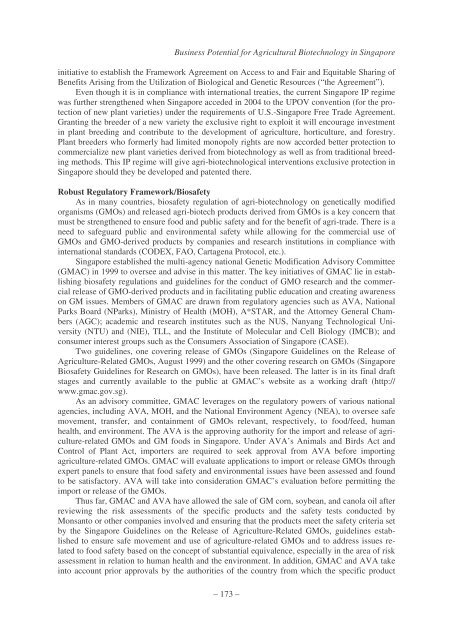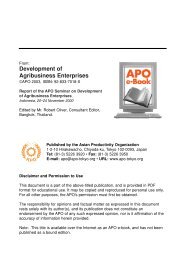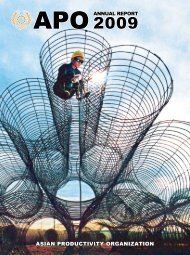Business Potential for Agricultural Biotechnology - Asian Productivity ...
Business Potential for Agricultural Biotechnology - Asian Productivity ...
Business Potential for Agricultural Biotechnology - Asian Productivity ...
Create successful ePaper yourself
Turn your PDF publications into a flip-book with our unique Google optimized e-Paper software.
<strong>Business</strong> <strong>Potential</strong> <strong>for</strong> <strong>Agricultural</strong> <strong>Biotechnology</strong> in Singapore<br />
initiative to establish the Framework Agreement on Access to and Fair and Equitable Sharing of<br />
Benefits Arising from the Utilization of Biological and Genetic Resources (“the Agreement”).<br />
Even though it is in compliance with international treaties, the current Singapore IP regime<br />
was further strengthened when Singapore acceded in 2004 to the UPOV convention (<strong>for</strong> the protection<br />
of new plant varieties) under the requirements of U.S.-Singapore Free Trade Agreement.<br />
Granting the breeder of a new variety the exclusive right to exploit it will encourage investment<br />
in plant breeding and contribute to the development of agriculture, horticulture, and <strong>for</strong>estry.<br />
Plant breeders who <strong>for</strong>merly had limited monopoly rights are now accorded better protection to<br />
commercialize new plant varieties derived from biotechnology as well as from traditional breeding<br />
methods. This IP regime will give agri-biotechnological interventions exclusive protection in<br />
Singapore should they be developed and patented there.<br />
Robust Regulatory Framework/Biosafety<br />
As in many countries, biosafety regulation of agri-biotechnology on genetically modified<br />
organisms (GMOs) and released agri-biotech products derived from GMOs is a key concern that<br />
must be strengthened to ensure food and public safety and <strong>for</strong> the benefit of agri-trade. There is a<br />
need to safeguard public and environmental safety while allowing <strong>for</strong> the commercial use of<br />
GMOs and GMO-derived products by companies and research institutions in compliance with<br />
international standards (CODEX, FAO, Cartagena Protocol, etc.).<br />
Singapore established the multi-agency national Genetic Modification Advisory Committee<br />
(GMAC) in 1999 to oversee and advise in this matter. The key initiatives of GMAC lie in establishing<br />
biosafety regulations and guidelines <strong>for</strong> the conduct of GMO research and the commercial<br />
release of GMO-derived products and in facilitating public education and creating awareness<br />
on GM issues. Members of GMAC are drawn from regulatory agencies such as AVA, National<br />
Parks Board (NParks), Ministry of Health (MOH), A*STAR, and the Attorney General Chambers<br />
(AGC); academic and research institutes such as the NUS, Nanyang Technological University<br />
(NTU) and (NIE), TLL, and the Institute of Molecular and Cell Biology (IMCB); and<br />
consumer interest groups such as the Consumers Association of Singapore (CASE).<br />
Two guidelines, one covering release of GMOs (Singapore Guidelines on the Release of<br />
Agriculture-Related GMOs, August 1999) and the other covering research on GMOs (Singapore<br />
Biosafety Guidelines <strong>for</strong> Research on GMOs), have been released. The latter is in its final draft<br />
stages and currently available to the public at GMAC’s website as a working draft (http://<br />
www.gmac.gov.sg).<br />
As an advisory committee, GMAC leverages on the regulatory powers of various national<br />
agencies, including AVA, MOH, and the National Environment Agency (NEA), to oversee safe<br />
movement, transfer, and containment of GMOs relevant, respectively, to food/feed, human<br />
health, and environment. The AVA is the approving authority <strong>for</strong> the import and release of agriculture-related<br />
GMOs and GM foods in Singapore. Under AVA’s Animals and Birds Act and<br />
Control of Plant Act, importers are required to seek approval from AVA be<strong>for</strong>e importing<br />
agriculture-related GMOs. GMAC will evaluate applications to import or release GMOs through<br />
expert panels to ensure that food safety and environmental issues have been assessed and found<br />
to be satisfactory. AVA will take into consideration GMAC’s evaluation be<strong>for</strong>e permitting the<br />
import or release of the GMOs.<br />
Thus far, GMAC and AVA have allowed the sale of GM corn, soybean, and canola oil after<br />
reviewing the risk assessments of the specific products and the safety tests conducted by<br />
Monsanto or other companies involved and ensuring that the products meet the safety criteria set<br />
by the Singapore Guidelines on the Release of Agriculture-Related GMOs, guidelines established<br />
to ensure safe movement and use of agriculture-related GMOs and to address issues related<br />
to food safety based on the concept of substantial equivalence, especially in the area of risk<br />
assessment in relation to human health and the environment. In addition, GMAC and AVA take<br />
into account prior approvals by the authorities of the country from which the specific product<br />
– 173 –
















